8th Grade Patriotism Inquiry
Is Protest Patriotic?Download Entire Inquiry Here
Staging the Compelling Question
Students read excerpts from Thomas Paine’s The Crisis (1776) and use the Question Formulation Technique (QFT) to generate companion questions addressing the inquiry topic. QFT is a useful tool for developing questions that consists of six deceptively simple steps—determine the question focus, brainstorm questions, refine the emerging questions, prioritize the questions, determine the next steps, and reflect.
- Source A: Thomas Paine, a passage from an essay in The American Crisis (excerpt), December 23, 1776 NOTE: Thomas Paine’s pamphlet Common Sense was the clarion call that began the American Revolution. As George Washington's troops retreated from New York through New Jersey, Paine again rose to the challenge of literary warfare. With The American Crisis, he delivered the words that would salvage the revolution.
Washington commanded that the freshly printed pamphlet be read aloud to his dispirited men; the rousing prose had its intended effect. Reciting Paine's impassioned words, the beleaguered troops mustered their remaining hopes for victory and crossed the icy Delaware River to defeat hung over Hessians on Christmas night and, on January 2, the British army's best general, Earl Cornwallis, at the Battle of Princeton. With victory in New Jersey, Washington won not only two battles but also the love and thanks of men and women.
THESE are the times that try men’s souls. The summer soldier and the sunshine patriot will, in this crisis, shrink from the service of their country; but he that stands it now, deserves the love and thanks of man and woman. Tyranny, like hell, is not easily conquered; yet we have this consolation with us, that the harder the conflict, the more glorious the triumph. What we obtain too cheap, we esteem too lightly: it is dearness only that gives every thing its value. Heaven knows how to put a proper price upon its goods; and it would be strange indeed if so celestial an article as freedom should not be highly rated. Britain, with an army to enforce her tyranny, has declared that she has a right (not only to tax) but “to bind us in all cases whatsoever,” and if being bound in that manner, is not slavery, then is there not such a thing as slavery upon earth. Even the expression is impious; for so unlimited a power can belong only to God.
Public domain.
Supporting Question 1- What were the main arguments of Vietnam War protesters?
...In our opinion, and from our experience, there is nothing in South Vietnam, nothing which could happen that realistically threatens the United States of America. And to attempt to justify the loss of one American life in Vietnam, Cambodia, or Laos by linking such loss to the preservation of freedom, which those misfits supposedly abuse, is to us the height of criminal hypocrisy, and it is that kind of hypocrisy which we feel has torn this country apart....
What Was Found and Learned in Vietnam
We found that not only was it a civil war, an effort by a people who had for years been seeking their liberation from any colonial influence whatsoever, but also we found that the Vietnamese whom we had enthusiastically molded after our own image were hard put to take up the fight against the threat we were supposedly saving them from.
We found most people didn’t even know the difference between communism and democracy. They only wanted to work in rice paddies without helicopters strafing them and bombs with napalm burning their villages and tearing their country apart. They wanted everything to do with the war, particularly with this foreign presence of the United States of America, to leave them alone in peace, and they practiced the art of survival by siding with whichever military force was present at a particular time, be it Viet Cong, North Vietnamese, or American.
We found also that all too often American men were dying in those rice paddies for want of support from their allies.
We saw firsthand how money from American taxes was used for a corrupt dictatorial regime. We saw that many people in this country had a one-sided idea of who was kept free by our flag, as blacks provided the highest percentage of casualties. We saw Vietnam ravaged equally by American bombs as well as by search and destroy missions, as well as by Viet Cong terrorism, and yet we listened while this country tried to blame all of the havoc on the Viet Cong.
We rationalized destroying villages in order to save them. We saw America lose her sense of morality as she accepted very coolly a My Lai and refused to give up the image of American soldiers who hand out chocolate bars and chewing gum.
We learned the meaning of free fire zones, shooting anything that moves, and we watched while America placed a cheapness on the lives of Orientals.
We watched the U.S. falsification of body counts, in fact the glorification of body counts. We listened while month after month we were told the back of the enemy was about to break. We fought using weapons against “Oriental human beings,” with quotation marks around that. We fought using weapons against those people which I do not believe this country would dream of using were we fighting in the European theater....
Request for Action by Congress
We are asking here in Washington for some action, action from the Congress of the United States of America, which has the power to raise and maintain armies, and which by the Constitution also has the power to declare war.
We have come here, not to the president, because we believe that this body can be responsive to the will of the people, and we believe that the will of the people says that we should be out of Vietnam now....
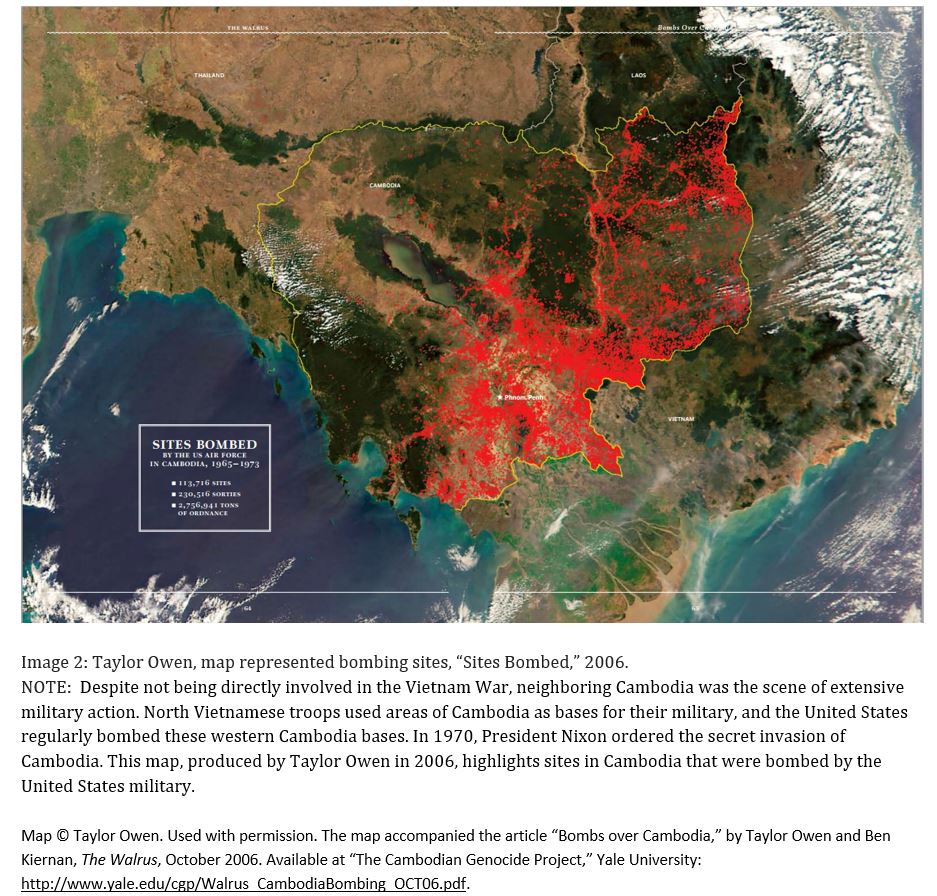
Supporting Question 2- What methods were used to protest the Vietnam War?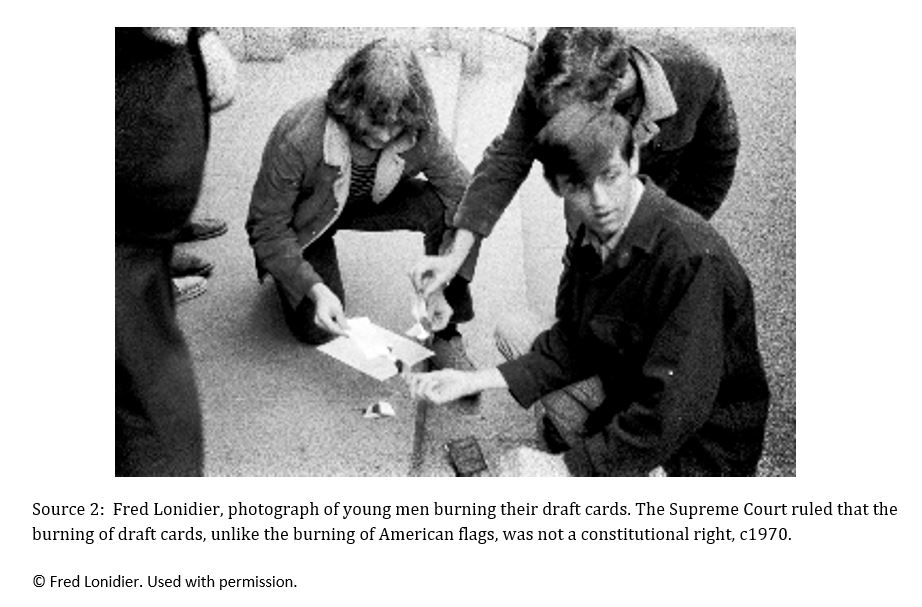
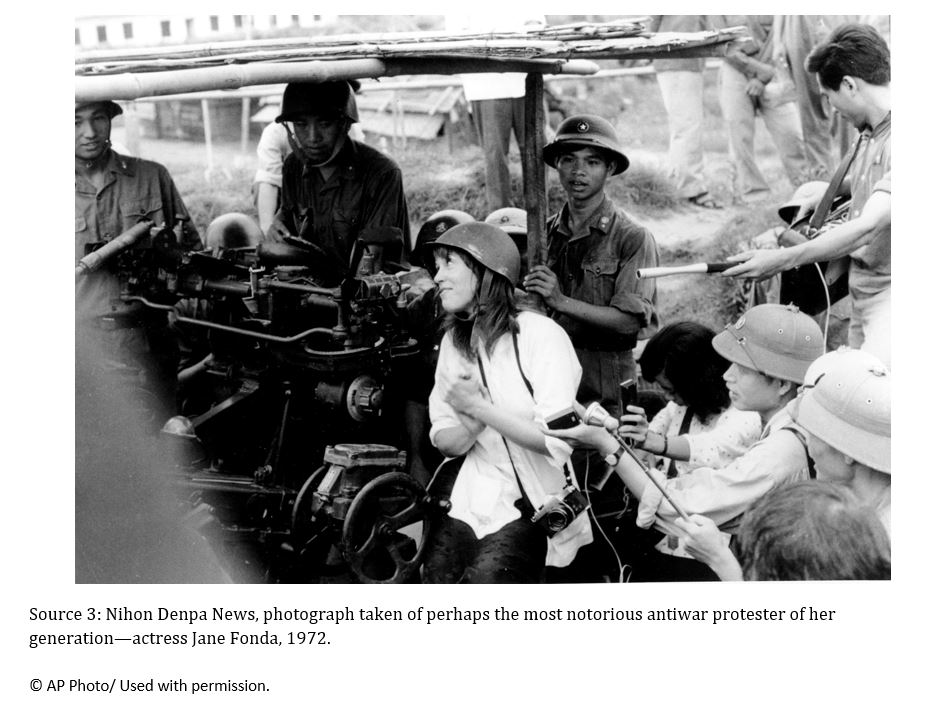
Clay Guilty in Draft Case; Gets Five Years in Prison
U.S. Judge Also Fines the Boxer $10,000 for Refusing Induction
By MARTIN WALDRON
Houston, June 20--Cassius Clay, the deposed heavyweight champion, was convicted by a jury tonight of violating the United States Selective Service laws by refusing to be drafted.
Federal District Judge Joe E. Ingraham sentenced Clay to five years in prison and fined him $10,000. This was the maximum penalty for the offense, which is a felony.
The judge's sentence was pronounced immediately at Clay's request.
"I'd appreciate it," the 25-year-old boxer said, "if the court will do it now, give me my sentence now, instead of waiting and stalling for time."
His lawyers said he "wants to be able to sleep tonight" without worrying what the sentence would be.
Clay, who had contended that his status as a Black Muslim minister made him exempt from the draft, stood passively in front of the judge's bench as the judge pronounced sentence.
Every eye in the crowded courtroom was on him as he stared straight ahead, saying, "No, sir," firmly when the judge asked him if he wanted to say anything that might go toward mitigating his sentence.
Before the sentencing, Morton Susman, United States Attorney, indicated that he would file no objection to the judge's giving Clay a lighter sentence than the maximum.
"The only record he has is a minor traffic offense," said Mr. Susman.
He said that Clay, as an athlete, had brought honor to the United States by winning in the Olympics in Rome in 1960, and had brought credit to himself by becoming heavyweight champion of the world.
"He became a Muslim in 1964 after defeating Sonny Liston for the title," said Mr. Susman. "In my opinion, his trouble started with that--this tragedy and the loss of his title can be traced to that."
After Clay had refused in April to take the Army induction oath, the World Boxing Association and the New York Athletic Commission stripped him of his title.
Mr. Susman, who was aided in the prosecution by a Negro assistant, Carl Walker, said that he had studied the Muslim order "and it is as much political as it is religious."
Clay, who had stood stiffly in his gray silk suit and black alligator shoes without speaking, could keep quiet no longer.
"If I can say so, sir," he said, "my religion is not political in no way."
There were a number of Muslim members in the courtroom for the verdict and the subsequent sentencing, but there was no outcry and no disturbance. A number of special agents of the Federal Bureau of Investigation were watching the audience along with Federal marshals.
The jury, six men and six women, all white, stayed in the jury box during the sentencing.
Clay's attorneys, Hayden C. Covington of New York City and Quinnan A. Hodges of Houston, took exception to Mr. Susman's remarks about the Muslims.
Denies Muslim Influence
Mr. Covington, who has won civil rights suits for Jehovah's Witnesses, a religious sect, in a number of constitutional cases, said: "I take exception to remarks that this man is under the influence of the Muslims in any way."
Clay, he said, is one of the finest men he has ever met and acted from "sincerity and honesty" when he refused last April 28 to step forward and be inducted into the armed services at Houston.
Both Mr. Covington and Mr. Hodges asked Judge Ingraham to put Clay on probation. Failing that, said Mr. Covington, the former champion should not be given a sentence more severe than those given in a similar cases. "That's 18 months," he said.
Judge Ingraham, after being told that Clay's attorneys would appeal, said that now was not the time to ask for clemency. If the conviction should be thrown out on appeal, "the sentence would be nil," he said, but if it should be upheld, that would be the time to seek a reduction in sentence or to seek probation.
Clay, who had known both applause and boos in his seven years as a boxer, did not seem downcast at today's turn of events.
His step was as jaunty as ever as he walked from the courtroom after being released on $5,000 bond. He held hands with two young women who had been with him during intermissions in the trial and he smiled at the crowd that gathered around. He allowed the television cameramen to surround him and shuffle him off down the street.
The jury was out considering the verdict for only about 20 minutes. Everyone knew before it retired that Clay would be convicted. He and his lawyers had not attempted to deny that he had refused induction. Their main contention was that the draft boards in Louisville, Ky., and in Houston had acted improperly in not granting him a deferment as a minister.
After Judge Ingraham had ruled that a study of the huge draft board file of the Clay case had convinced him that the draft boards had not acted "arbitrarily or capriciously" in refusing the deferment. Clay's conviction became a foregone conclusion.
Pays No Attention
Clay paid no attention to the legal maneuvering during the day. He sat at the defense table, drawing and chewing gum.
During recesses, while Clay stood out in the corridors in the Federal Courthouse and signed autographs for children, one of his attorneys showed reporters some of the drawings that Clay had made. One showed an airplane flying over a heavily wooded mountain range toward the rising sun. Another portrayed a ship sailing head-on into a fjord between two mountain ranges.
Clay himself exhibited other drawings--mystic symbols, clouds and so forth. One was an elaborate sketch of the words "Muhammad Ali," which is his Muslim name.
In all, the jury heard only an hour or so of testimony, most of it from government witnesses.
Source 4: Martin Waldron, article about Cassius Clay (later Muhammad Ali) being found guilty of avoiding the draft, New York Times, June 21, 1967.
From the New York Times, June 21, 1967 © 1967 The New York Times. All rights reserved. Used by permission and protected by the Copyright Laws of the United States. The printing, copying, redistribution, or retransmission of this Content without express written permission is prohibited. http://www.nytimes.com/learning/general/onthisday/big/0620.html#article.
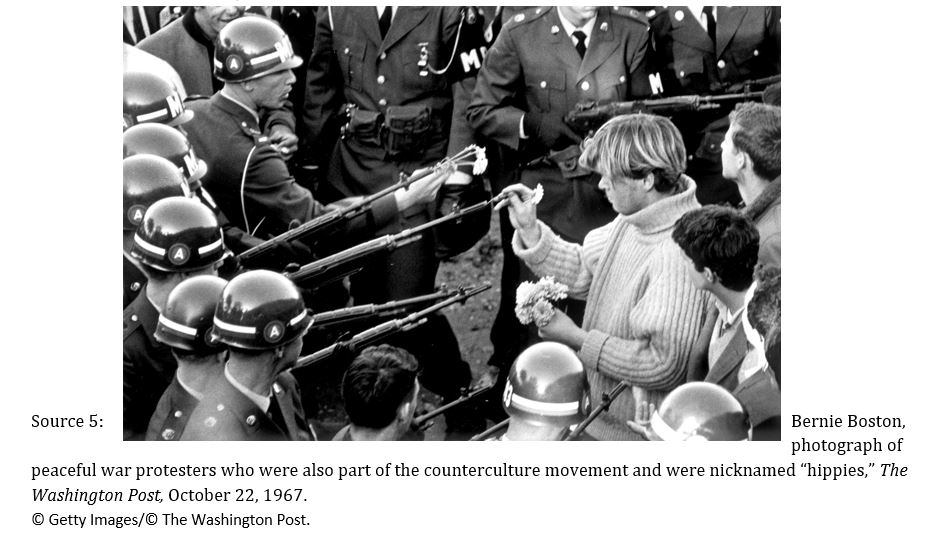
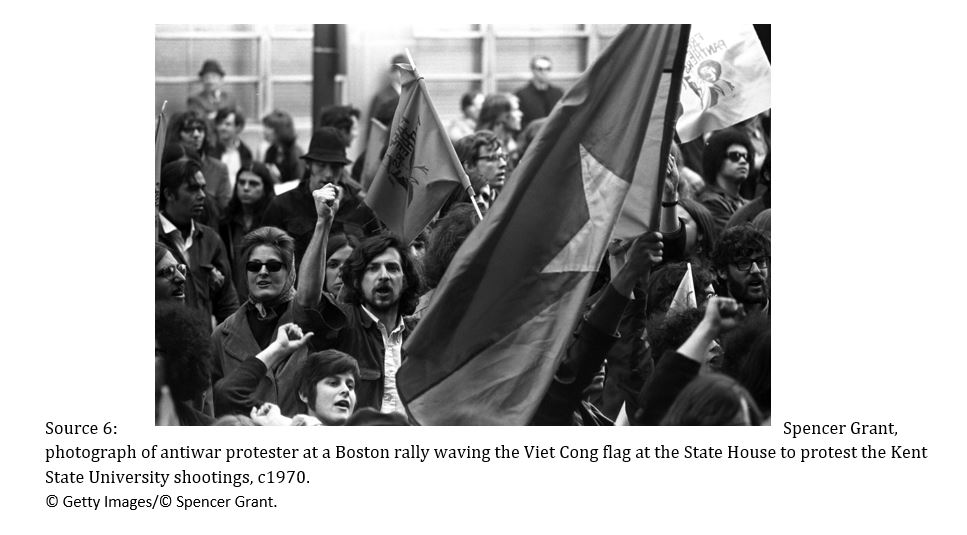
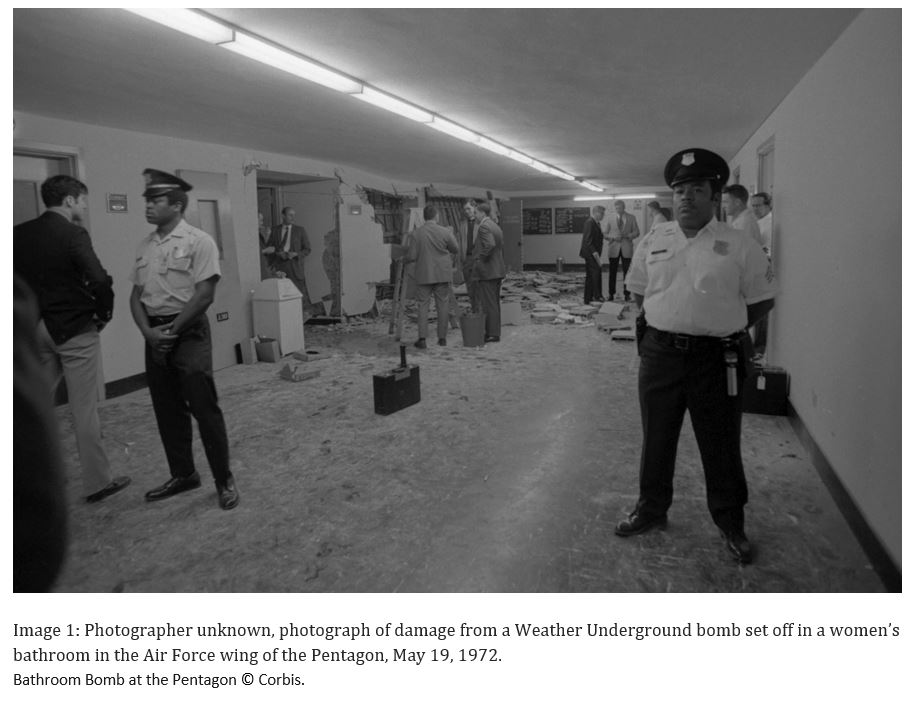
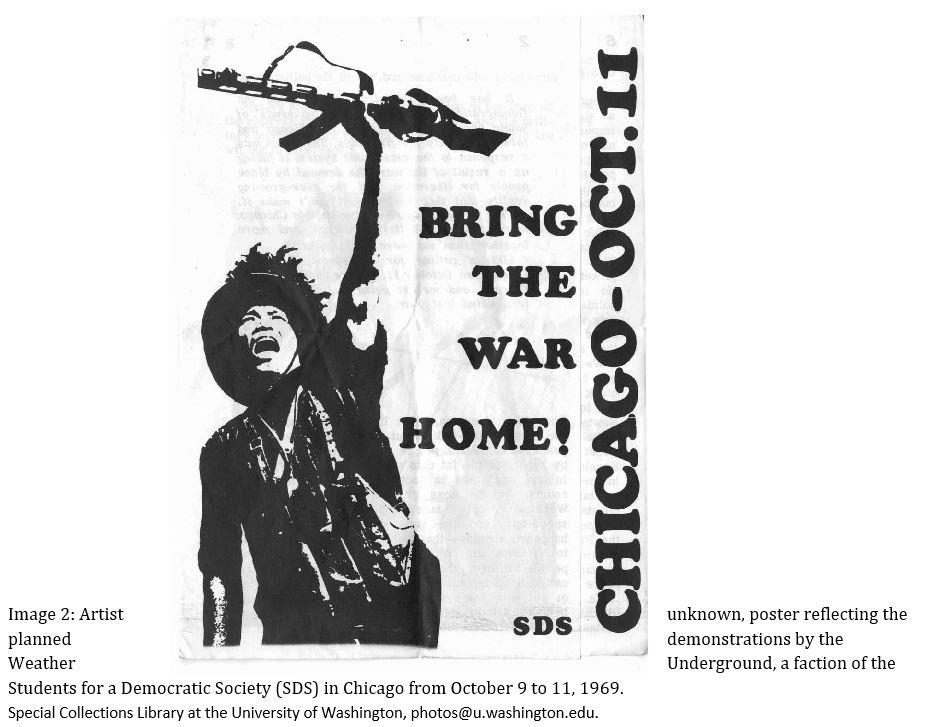
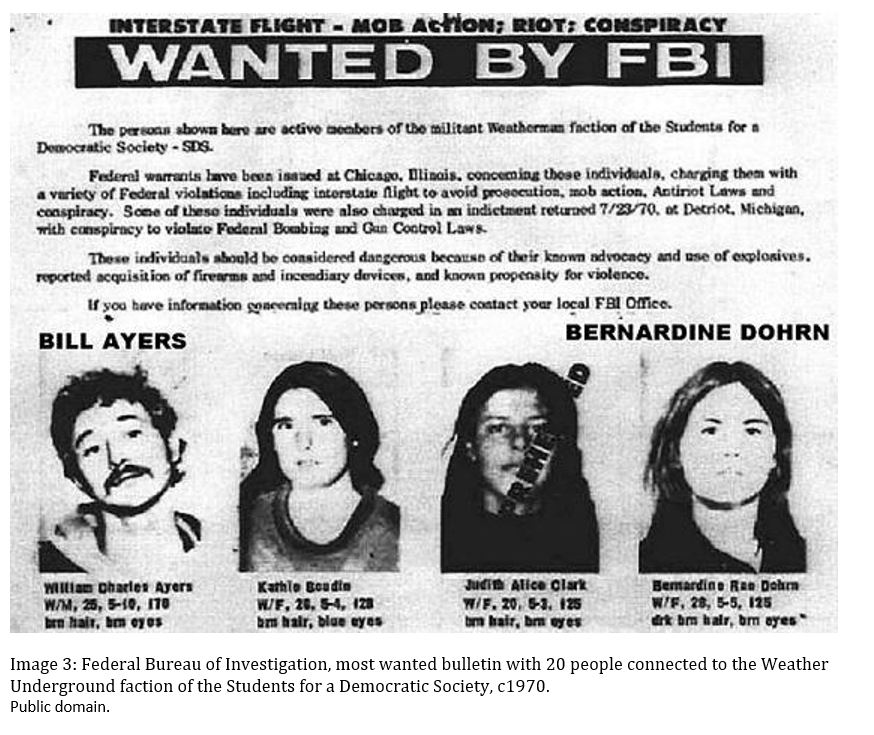
- Source A: Data bank: Vietnam War statistics
- Source B: Cleveland Plain Dealer, front-page reporting on the My Lai Massacre, November 29, 1969
- Source C: John Kerry, testimony to the United States Senate Foreign Relations Committee as a representative of a group of Vietnam veterans opposed to the war (excerpts), April 22, 1971
...In our opinion, and from our experience, there is nothing in South Vietnam, nothing which could happen that realistically threatens the United States of America. And to attempt to justify the loss of one American life in Vietnam, Cambodia, or Laos by linking such loss to the preservation of freedom, which those misfits supposedly abuse, is to us the height of criminal hypocrisy, and it is that kind of hypocrisy which we feel has torn this country apart....
What Was Found and Learned in Vietnam
We found that not only was it a civil war, an effort by a people who had for years been seeking their liberation from any colonial influence whatsoever, but also we found that the Vietnamese whom we had enthusiastically molded after our own image were hard put to take up the fight against the threat we were supposedly saving them from.
We found most people didn’t even know the difference between communism and democracy. They only wanted to work in rice paddies without helicopters strafing them and bombs with napalm burning their villages and tearing their country apart. They wanted everything to do with the war, particularly with this foreign presence of the United States of America, to leave them alone in peace, and they practiced the art of survival by siding with whichever military force was present at a particular time, be it Viet Cong, North Vietnamese, or American.
We found also that all too often American men were dying in those rice paddies for want of support from their allies.
We saw firsthand how money from American taxes was used for a corrupt dictatorial regime. We saw that many people in this country had a one-sided idea of who was kept free by our flag, as blacks provided the highest percentage of casualties. We saw Vietnam ravaged equally by American bombs as well as by search and destroy missions, as well as by Viet Cong terrorism, and yet we listened while this country tried to blame all of the havoc on the Viet Cong.
We rationalized destroying villages in order to save them. We saw America lose her sense of morality as she accepted very coolly a My Lai and refused to give up the image of American soldiers who hand out chocolate bars and chewing gum.
We learned the meaning of free fire zones, shooting anything that moves, and we watched while America placed a cheapness on the lives of Orientals.
We watched the U.S. falsification of body counts, in fact the glorification of body counts. We listened while month after month we were told the back of the enemy was about to break. We fought using weapons against “Oriental human beings,” with quotation marks around that. We fought using weapons against those people which I do not believe this country would dream of using were we fighting in the European theater....
Request for Action by Congress
We are asking here in Washington for some action, action from the Congress of the United States of America, which has the power to raise and maintain armies, and which by the Constitution also has the power to declare war.
We have come here, not to the president, because we believe that this body can be responsive to the will of the people, and we believe that the will of the people says that we should be out of Vietnam now....
- Source D: Image Bank: Escalation into Cambodia
Supporting Question 2- What methods were used to protest the Vietnam War?
- Source A: Norman Whitfield and Barrett Strong, lyrics from a 1960s pop song, “War,” 1969
War, huh, yeah
What is it good for?
Absolutely nothing, oh hoh, oh
War, huh, yeah
What is it good for?
Absolutely nothing, say it again, y’all
War, huh, good God
What is it good for?
Absolutely nothing, listen to me
Oh, war, I despise
‘Cause it means destruction of innocent lives
War means tears to thousands of mothers’ eyes
When their sons go off to fight and lose their lives
I said
War, huh, good God y’all
What is it good for?
Absolutely nothing, just say it again
War, whoa Lord
What is it good for?
Absolutely nothing, listen to me
War, it ain’t nothin’ but a heartbreak
War, friend only to the undertaker
Oh war, is an enemy to all mankind
The thought of war blows my mind
War has caused unrest within the younger generation
Induction, then destruction, who wants to die?
War, good God y’all
What is it good for?
Absolutely nothing, say it, say it, say it
War, uh huh, yeah, huh
What is it good for?
Absolutely nothing, listen to me
War, it ain’t nothin’ but a heartbreaker
War, it’s got one friend, that’s the undertaker
Oh, war has shattered many young man’s dreams
Made him disabled, bitter and mean
Life is much too short and precious to spend fighting wars these days
War can’t give life, it can only take it away, ooh
War, huh, good God y’all
What is it good for?
Absolutely nothing, say it again
War, whoa, Lord
What is it good for?
Absolutely nothing, listen to me
War, it ain’t nothin’ but a heartbreaker
War, friend only to the undertaker
Peace love and understanding tell me
Is there no place for them today?
They say we must fight to keep our freedom
But Lord knows there’s got to be a better way
War, huh, good God y’all
What is it good for?
You tell ‘em, say it, say it, say it, say it
War, good Lord, huh
What is it good for?
Stand up and shout it, nothing
War, it ain’t nothin’ but a heartbreaker
War. Words and Music by Norman Whitfield and Barrett Strong. © 1970 (Renewed 1998) JOBETE MUSIC CO., INC. All Rights Controlled and Administered by EMI BLACKWOOD MUSIC INC. on behalf of STONE AGATE MUSIC (A Division of JOBETE MUSIC CO., INC.) All Rights Reserved International Copyright Secured Used by Permission. Reprinted by Permission of Hal Leonard Corporation.
- Source B: Source bank: Vietnam War protests
Clay Guilty in Draft Case; Gets Five Years in Prison
U.S. Judge Also Fines the Boxer $10,000 for Refusing Induction
By MARTIN WALDRON
Houston, June 20--Cassius Clay, the deposed heavyweight champion, was convicted by a jury tonight of violating the United States Selective Service laws by refusing to be drafted.
Federal District Judge Joe E. Ingraham sentenced Clay to five years in prison and fined him $10,000. This was the maximum penalty for the offense, which is a felony.
The judge's sentence was pronounced immediately at Clay's request.
"I'd appreciate it," the 25-year-old boxer said, "if the court will do it now, give me my sentence now, instead of waiting and stalling for time."
His lawyers said he "wants to be able to sleep tonight" without worrying what the sentence would be.
Clay, who had contended that his status as a Black Muslim minister made him exempt from the draft, stood passively in front of the judge's bench as the judge pronounced sentence.
Every eye in the crowded courtroom was on him as he stared straight ahead, saying, "No, sir," firmly when the judge asked him if he wanted to say anything that might go toward mitigating his sentence.
Before the sentencing, Morton Susman, United States Attorney, indicated that he would file no objection to the judge's giving Clay a lighter sentence than the maximum.
"The only record he has is a minor traffic offense," said Mr. Susman.
He said that Clay, as an athlete, had brought honor to the United States by winning in the Olympics in Rome in 1960, and had brought credit to himself by becoming heavyweight champion of the world.
"He became a Muslim in 1964 after defeating Sonny Liston for the title," said Mr. Susman. "In my opinion, his trouble started with that--this tragedy and the loss of his title can be traced to that."
After Clay had refused in April to take the Army induction oath, the World Boxing Association and the New York Athletic Commission stripped him of his title.
Mr. Susman, who was aided in the prosecution by a Negro assistant, Carl Walker, said that he had studied the Muslim order "and it is as much political as it is religious."
Clay, who had stood stiffly in his gray silk suit and black alligator shoes without speaking, could keep quiet no longer.
"If I can say so, sir," he said, "my religion is not political in no way."
There were a number of Muslim members in the courtroom for the verdict and the subsequent sentencing, but there was no outcry and no disturbance. A number of special agents of the Federal Bureau of Investigation were watching the audience along with Federal marshals.
The jury, six men and six women, all white, stayed in the jury box during the sentencing.
Clay's attorneys, Hayden C. Covington of New York City and Quinnan A. Hodges of Houston, took exception to Mr. Susman's remarks about the Muslims.
Denies Muslim Influence
Mr. Covington, who has won civil rights suits for Jehovah's Witnesses, a religious sect, in a number of constitutional cases, said: "I take exception to remarks that this man is under the influence of the Muslims in any way."
Clay, he said, is one of the finest men he has ever met and acted from "sincerity and honesty" when he refused last April 28 to step forward and be inducted into the armed services at Houston.
Both Mr. Covington and Mr. Hodges asked Judge Ingraham to put Clay on probation. Failing that, said Mr. Covington, the former champion should not be given a sentence more severe than those given in a similar cases. "That's 18 months," he said.
Judge Ingraham, after being told that Clay's attorneys would appeal, said that now was not the time to ask for clemency. If the conviction should be thrown out on appeal, "the sentence would be nil," he said, but if it should be upheld, that would be the time to seek a reduction in sentence or to seek probation.
Clay, who had known both applause and boos in his seven years as a boxer, did not seem downcast at today's turn of events.
His step was as jaunty as ever as he walked from the courtroom after being released on $5,000 bond. He held hands with two young women who had been with him during intermissions in the trial and he smiled at the crowd that gathered around. He allowed the television cameramen to surround him and shuffle him off down the street.
The jury was out considering the verdict for only about 20 minutes. Everyone knew before it retired that Clay would be convicted. He and his lawyers had not attempted to deny that he had refused induction. Their main contention was that the draft boards in Louisville, Ky., and in Houston had acted improperly in not granting him a deferment as a minister.
After Judge Ingraham had ruled that a study of the huge draft board file of the Clay case had convinced him that the draft boards had not acted "arbitrarily or capriciously" in refusing the deferment. Clay's conviction became a foregone conclusion.
Pays No Attention
Clay paid no attention to the legal maneuvering during the day. He sat at the defense table, drawing and chewing gum.
During recesses, while Clay stood out in the corridors in the Federal Courthouse and signed autographs for children, one of his attorneys showed reporters some of the drawings that Clay had made. One showed an airplane flying over a heavily wooded mountain range toward the rising sun. Another portrayed a ship sailing head-on into a fjord between two mountain ranges.
Clay himself exhibited other drawings--mystic symbols, clouds and so forth. One was an elaborate sketch of the words "Muhammad Ali," which is his Muslim name.
In all, the jury heard only an hour or so of testimony, most of it from government witnesses.
Source 4: Martin Waldron, article about Cassius Clay (later Muhammad Ali) being found guilty of avoiding the draft, New York Times, June 21, 1967.
From the New York Times, June 21, 1967 © 1967 The New York Times. All rights reserved. Used by permission and protected by the Copyright Laws of the United States. The printing, copying, redistribution, or retransmission of this Content without express written permission is prohibited. http://www.nytimes.com/learning/general/onthisday/big/0620.html#article.
- Source C: Image bank: Weather Underground
Supporting Question 3- Why did some Americans consider the Vietnam War protesters unpatriotic?
- Source A: Robert Meloon, newspaper article about student protests against the Vietnam War at the University of Wisconsin, “Legislators Demand Stiff Penalties for Dow Chemical Protesters,” The Capital Times (excerpts), October 1967 NOTE: Soon after student protests against Dow Chemical (manufacturers of napalm) turned violent, University of Wisconsin officials were called on the carpet at the state house. Legislators suspected their state university of housing communists, inciting treasonous behavior, and importing activists from other parts of the nation to stir things up. Madison's liberal afternoon newspaper, The Capital Times, was losing readership, partly because of its antiwar position; it covered the legislature's reactions in this article.
Strict disciplining of campus demonstrators was demanded Wednesday by state legislators after they received a report on the violence from Lt. Gov. Jack Olson.
The Assembly adopted 94 to 5 a resolution calling for stiff penalties for the students and expulsion “whenever necessary.”
The resolution called the protests “a flagrant abuse and perversion of the treasured traditions of academic freedoms....”
In his talk to the legislators, Lt. Gov. Olson also called for a get-tough policy at the University.
“Anyone who has taken part in this type of riot has no place in the University,” he said.
In the Senate, Sen. Leland McParland (D-Cudahy) said he was “sick of students running the University.”
“We should shoot them if necessary,” McParland said. “I would, I would, because it’s insurrection,” he added....
“Communism is on that University campus and it’s operating today,” [Sen. Gordon] Roseleip [(R-Darlington)] said. He called for a legislative investigation of the demonstrations.
Sen. Ernest Keppler (R-Sheboygan) cautioned the senators that “we are dealing with only a small percentage of the student body.”
“But we should deal with them severely,” he added....
Assemblyman Edward Mertz (D-Milwaukee) called the students “long-haired, greasy pigs” and insisted the Legislature should take over running the University....
[Assemblyman Harvey] Dueholm [(D-Luck)] called the Assembly’s action “mass hysteria.”
“Let the law take its course but we shouldn’t sit here and tell them what to do,” he said. “I think the Regents can run the University.” © Capital Newspapers. Used with permission. - Source B: Richard Nixon, speech about the progress of the Vietnam War, “Address to the Nation on the War in Vietnam” (excerpts), November 3, 1969 In speaking of the consequences of a precipitate withdrawal, I mentioned that our allies would lose confidence in America.
Far more dangerous, we would lose confidence in ourselves. Oh, the immediate reaction would be a sense of relief that our men were coming home. But as we saw the consequences of what we had done, inevitable remorse and divisive recrimination would scar our spirit as a people.
We have faced other crises in our history and have become stronger by rejecting the easy way out and taking the right way in meeting our challenges. Our greatness as a nation has been our capacity to do what had to be done when we knew our course was right.
I recognize that some of my fellow citizens disagree with the plan for peace I have chosen. Honest and patriotic Americans have reached different conclusions as to how peace should be achieved.
In San Francisco a few weeks ago, I saw demonstrators carrying signs reading: "Lose in Vietnam, bring the boys home."
Well, one of the strengths of our free society is that any American has a right to reach that conclusion and to advocate that point of view. But as President of the United States, I would be untrue to my oath of office if I allowed the policy of this nation to be dictated by the minority who hold that point of view and who try to impose it on the nation by mounting demonstrations in the street.
For almost 200 years, the policy of this Nation has been made under our Constitution by those leaders in the Congress and the White House elected by all of the people. If a vocal minority, however fervent its cause, prevails over reason and the will of the majority, this Nation has no future as a free society.…
I know it may not be fashionable to speak of patriotism or national destiny these days. But I feel it is appropriate to do so on this occasion.
Two hundred years ago this Nation was weak and poor. But even then, America was the hope of millions in the world. Today we have become the strongest and richest nation in the world. And the wheel of destiny has turned so that any hope the world has for the survival of peace and freedom will be determined by whether the American people have the moral stamina and the courage to meet the challenge of free world leadership.
Let historians not record that when America was the most powerful nation in the world we passed on the other side of the road and allowed the last hopes for peace and freedom of millions of people to be suffocated by the forces of totalitarianism.
And so tonight — to you, the great silent majority of my fellow Americans — I ask for your support.
I pledged in my campaign for the Presidency to end the war in a way that we could win the peace. I have initiated a plan of action which will enable me to keep that pledge.
The more support I can have from the American people, the sooner that pledge can be redeemed; for the more divided we are at home, the less likely the enemy is to negotiate at Paris.
Let us be united for peace. Let us also be united against defeat. Because let us understand: North Vietnam cannot defeat or humiliate the United States. Only Americans can do that. - Source C: Source bank: Hardhat rallies